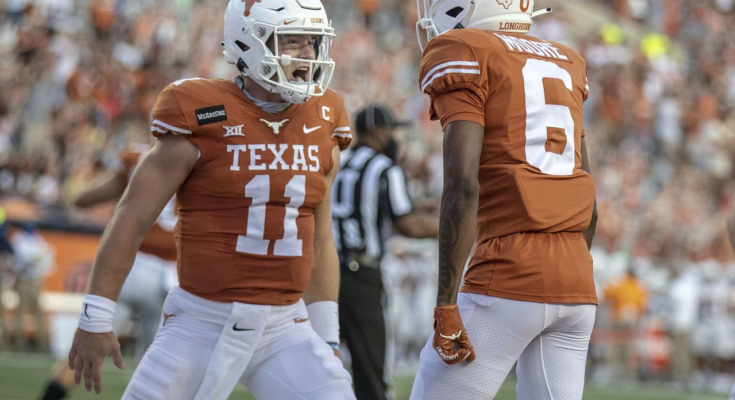In a wild Texas state senate committee hearing that stretched on for more than six hours, some of the biggest remaining questions about Texas’ move to the Southeastern Conference were answered.
University of Texas president Jay Hartzell testified that he first reached out to SEC commissioner Greg Sankey this past spring on whether the conference was interested in adding the Longhorns. When pressed on that detail multiple times, including whether SEC first contacted Texas, Hartzell said, “They neither reached out nor was I directed to reach out. I reached out on my own accord.” The Texas president sent overtures to the SEC after he said he started getting comfortable in fall 2020 with the idea of pursuing conference affiliation possibilities outside of the Big 12 which included conversations with University of Oklahoma president Joseph Harroz.
After a Zoom call with Sankey this spring, Hartzell said it wasn’t until the summer that Texas felt comfortable that if it left the Big 12 it’d have a home in the SEC. Texas did not reach out to any conferences other than the SEC, according to Hartzell, but did consider the Atlantic Coast Conference, Big Ten and Pac-12. It stemmed from Texas’ concerns that the Big 12′s future beyond 2025 was not as attractive as options elsewhere.
“I was concerned about the way things were heading and concerned about the risk and uncertainty for the future,” Hartzell said. “I thought there might be a place that had less risk and more certainty.”
Texas, along with Oklahoma, officially accepted the SEC’s invitation on July 30 to join its conference starting in July 2025. The whirlwind nature of Texas’ move to the SEC prompted the Texas state senate committee hearing on the future of college sports in Texas. There were a lot of questions about who knew what when and the potential impact of Texas’ departure for greener pastures in the SEC.
Hartzell was the last act of the day after Big 12 commissioner Bob Bowlsby and other Texas university presidents and athletic directors testified during a hearing that started at 1 p.m. CT and stretched into the evening. There were plenty of zingers and questions that seemed to be directly inspired by baseless message board rumors and Twitter speculation. There were interesting comments throughout the hearing, including Bowlsby stating the Big 12 would consider merging with another conference and Baylor AD Mack Rhoades taking a shot at the Longhorns, but Hartzell delivered the most newsworthy comments.
The Texas president was repeatedly asked about the role ESPN played in Texas’ decision to leave the Big 12 for the SEC. Those questions came after Bowlsby sent ESPN a cease-and-desist letter last week alleging the television network’s involvement in swaying Big 12 schools to join another conference. ESPN strongly pushed back on those allegations and said Bowlsby’s letter had no merit. Bowlsby said Monday he had agreed “not to escalate this publicly” when questioned about his ESPN letter. When Hartzell was asked about whether Texas consulted with ESPN on its move, he said, “absolutely, categorically, no.” The Texas president said only three people other than himself were directly involved in the decision and none was anyone at ESPN.
Hartzell also revealed that his expectation is ESPN will wind down Longhorn Network but that those specifics haven’t been discussed. Texas and ESPN signed a 20-year, $300 million deal in 2011 but the industry expectation has been that LHN wouldn’t continue as a standalone entity once Texas joins the SEC which already has the SEC Network. He also shut down reports that Texas could use a large buyout from ESPN to pay to get Texas and Oklahoma out of the Big 12 early. The two schools will have to pay a combined amount upwards of $150 million to leave the Big 12 before the current grant of rights deal expires.
“I grew up in Oklahoma,” Hartzell said, “but I’m not going to pay their exit fee.”
John Talty is the sports editor and SEC Insider for Alabama Media Group. You can follow him on Twitter @JTalty.


